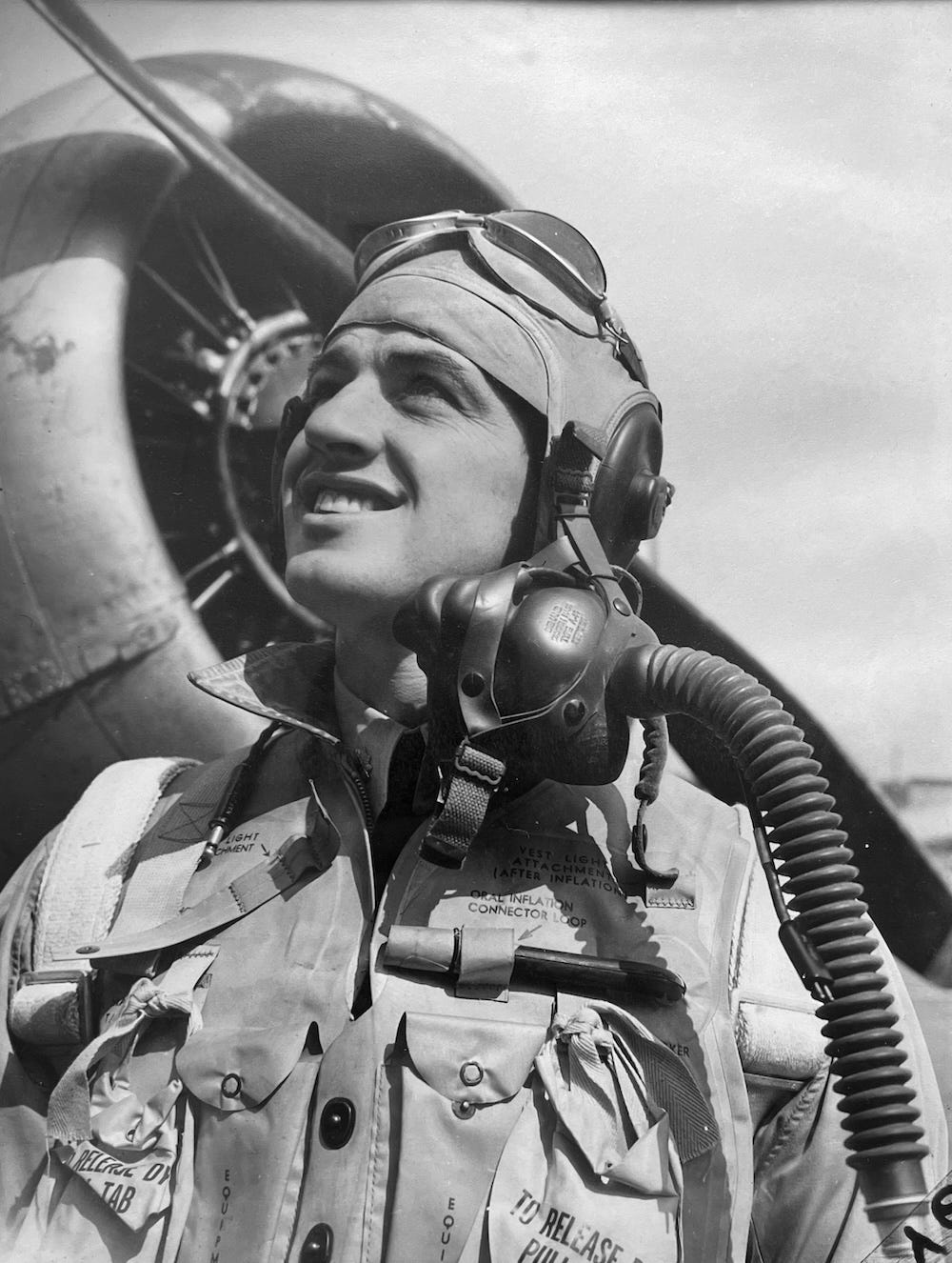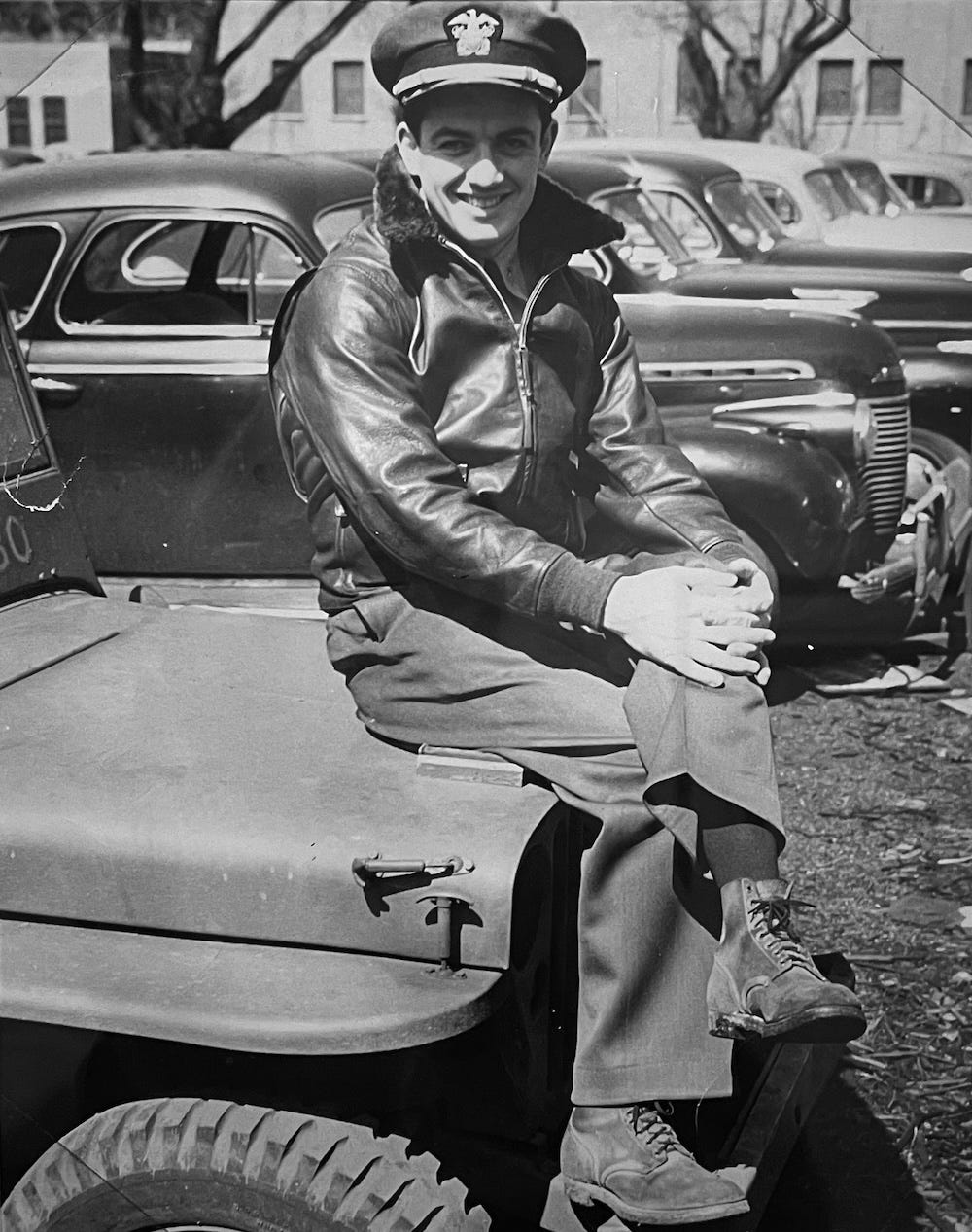One Saturday afternoon, seven years old and bored, I pulled down the ladder to our family’s attic, climbed up and crept into that hidden, windowless world. There on a shelf was a box, and inside was my father’s World War II Navy dress uniform, hat included. It seemed like some unknown person’s costume. The only visible reminder of the war in my scenes of childhood was a black and white 8½ by 11 plane-side portrait of my father. There he stood enclosed in the frame, his aviator goggles strapped to his forehead, gazing skyward. I knew what a squadron was. I knew that Joe Kennedy, the “Lost Prince,” had been in my father’s. And I knew that was why we had a vinyl recording of President Kennedy and his brothers Bobby and Teddy—their Hahvahd Yahd drawls unmistakable—calling into my father’s Navy squadron reunion. But I never knew until he died in 2011 that my father had been awarded the British Distinguished Flying Cross. His were the circumstances of a soldier, but he possessed the soul of a poet.
Although their backgrounds were oppositional, the end of the war brought my parents together. My father’s love of poetry provided the allure. In the fall of 1945, after they had first met that summer in Chicago, my father pursued my mother. Decked out in that white-starched Navy Lieutenant Commander’s uniform, he visited her in Northampton, Massachusetts, where she was a junior at Smith College. “[You were] ‘a phantom of delight / When first [you] gleamed upon my sight’” he would recite, whispering in her ear. My father the Bard chose his Wordsworth well, right down to my mother’s twilight dusky hair—and the rest of her drawn from “May-time and the cheerful Dawn / A dancing Shape, an Image gay / To haunt, to startle, and way-lay.” It must have seemed like something right out of a Thomas Hardy novel when my parents discovered that they shared the same birthday: May 15th.
Sitting out on the porch of her dormitory, Wallace House, the following spring, waiting for the girls to come downstairs to begin the graduation festivities, my father made conversation with a stone-faced gentleman, clearly a father, dressed in an Admiral’s uniform. “Where did you prep?” the Admiral queried, the clip of his accent almost British. An Irish lad from Wilmington, Delaware and a large public high school graduate, my father deadpanned, “P.S. 75.”
The war stayed in the attic, locked inside that photograph, and disappeared from our day-to-day family life, at least during waking hours. On rare occasions my father would tell a war story—often comical—like the Admiral, megaphone in hand, who held back the landing boats filled with desperate sailors ready to hit the Honolulu bars, bellowed off the destroyer’s port side: “Don’t shove off ‘til I say shove off!”—then waited and waited before finally releasing them—“Shove off!” Like all good story tellers, my father knew how to hold that pause, and I sat across from him, pulled in and desperate as those sailors.
But for the most part, only my father’s nightmares remained. He’d shout out into the quiet, dark house from the plane he was piloting in his dreams. The smoke and diesel stench in the fuselage, the interminable, yet reassuring, hum and grind of the engine taking them closer to the British coastline, the terror of squadron members hit, or worse, spiraling down into the gray, gray expanse spread out below—inhabited his psyche, disclosed the war’s scars offstage, and put our family on notice without any needed explanation that war was real, frightening, and its effects profound.
Keep reading with a 7-day free trial
Subscribe to Consequence to keep reading this post and get 7 days of free access to the full post archives.





